by Sachi Sri Kantha, March 13, 2013
I continue with MGR’s thoughts about his mother in chapter 127 of his autobiography. I have included some segments of this chapter in Part 3 of this series. The remaining segments are translated below. Having lost his father before he reached three years, for MGR, his mother played the dual role as father-cum-mother until she died in 1952. MGR reminisces those young days as follows:
“She used to call me occasionally, when others criticized him: ‘He washed my womb; don’t criticize him’. This means, I was the last child for her. Therefore, don’t say nasty things about him. She had never received this sort of love from me.
But, I have never wavered in believing my mother as the God. However, we did have occasional conflicts. My elder brother (Chakrapani) would never interfere in this conflict. But, when the conflict reaches a high point, he do intercede between us to bring out a resolution. To those in the house, he’d quip, ‘Don’t fool yourself by thinking that these two are always in conflict. But suddenly, they will join together, and we are the ones who’ll be isolated.’ To this, my mother would retort in defending myself. ‘Why not? We are no generational enemies, to continue as enemies. [He is] of young blood. Whatever it is, he is my son. Like me, he also has his dignity, speed and thoughts.’
For this, my brother won’t worry about anything. His want was to bring an end to our conflict. Having achieved this, he’d be glad, and he’d leave the scene silently. To this movement, my mother would retort again: ‘Hey! Big guy’ I know everything. You think that you had fooled us, by asserting something. Do you know, it’s we who had stopped the conflict.’ Then, she would request her daughter in law (Chakrapani’s wife) ‘Will you call him (i.e, me). In anger, he’d not eat?’ and at the sametime, she’d come out and stop me from leaving home, and feed me. This was our mother. Not only our mother; all mothers have the same passion to their kids like this.
After M.R. Radha elder left the company, I picked up his role as ‘Veeramuthu’. And, [after I displayed my talents], the situation arose to an extent that if I don’t feature in that role, the climax fight scene wouldn’t get audience appreciation. It’s because of this, even when I was suffering from cholera, I was asked to fight in that climax scene first, and then to take rest.
On another day, I was acting in ‘Pathi Bakthi’ drama and had to act in a fighting scene with Mr. Kali N. Ratnam. I had to fight, to give popularity to him. (This is how, some provide their ‘spin’ these days!). On that day, in the scene, Mr. Kali N. Ratnam had to raise me and throw. But, my attack was speedier on that day than usual. I’d press my two hands on his shoulders and raise my body. He’d hold my waist and within one or two seconds had to push me behind. For the audience, it would appear that he was effortlessly throwing me and the audience would applaud his action. On that day, he had some dull reflexes in responding to my speedier stunt. Rather than he throwing me, after holding my waist, he merely pushed me. I fell flat with my face down. However with sudden reflex, I prevented damage to my teeth and nose, by landing on two hands. Especially, the right hand was seriously hurt. I didn’t feel it immediately, as we had to adjust for the next scene.
Immediately when I tried to raise by my right hand, I felt it had no ‘weight’ and I fell down. By using the left hand, I was able to get up. My right hand had swollen and I was in pain. Near the wrist, underneath the thumb, pain was intolerable. When I returned home, mother provided first aid, using folk remedy. For four or five days, I suffered from pain and I couldn’t even brush my teeth. So, I had to depend on my mother for cleaning my mouth and feeding.
When I stood up, mother couldn’t reach my mouth! How long, I had to bend? So, she uses her derisive pet name for me, ‘Hey Mudihala! (empthying demon) Why you are killing me, after growing up? Then, she’d feed me with nutritious items with her own hands. In those days, medical treatments for such broken-bone accidents were hardly available. Even if they were available, it was beyond our reach. Somehow, I had to recover from such injury quickly. By the next Saturday or Sunday, I had to be ready for the same role in Pathi Bakthi drama. I cannot reject it. I was scared, if I did so, the company owner would replace me with someone else. For that one week period, I was blessed by the feeding of my mother from her own hand. That unusual gift soothed my pain tremendously. Even when I think about it now, I feel like being pumped with new energy.
When I mention this, don’t think that I’m exaggerating unnecessarily. If you feel like that, just taste for yourself being fed by your mother. Nothing can best the taste and the mind relief you get. Any child who grows with mother’s love, would never take the external burdens seriously.
I’m pleased to assert that I was blessed with such motherly love and greetings and these were the strengths that guide me.”
This was what MGR recorded in 1972. Nine years later, when he successively held the Fifth International Tamil Research Conference/Seminar in Madurai, the same message did appear in a souvenir released on that occasion, in an interview with Copper Cochin. The interviewer wrote,
“He (MGR) was deeply influenced by his late mother who was his philosopher and guide in everything. He told me, ‘My mother said, whenever you devote time to any work you should devote your entire time and immerse yourself completely in that work. She also taught me two things. ‘If you are a fatalist, then leave things to fate as it is not in your hands. If, on the other hand, you want to do things by your own efforts, then you must do so to the best of your conscience and ability. After your day’s work is done take rest and when you go to bed do not worry about that day’s events. When you wake up next day you can resume work refreshed. Do not postpone things, one does not know when death will come’. He paused for a moment and said reflectively, ‘What I have done, what I will do in the future, is as a result of my mother’s teachings. I am following her precepts’.”
Reminiscences of entry into the movies
To the interviewer Copper Cochin, MGR had reminisced that he entered the Madurai Original Boys Company (Proprietor Mr. S.M. Sachidanandam Pillai) when he was seven (around 1924) and his elder brother was 15. “We did not do it in order to become actors. We did it for the food and the money and to relieve my mother from the burden of providing food for us. Do you know we were given food, clothing and 25 paise a week pocket money, which we did not need at all.” In the pre-Independent India, if one paise was equivalent to 1/64 rupee, the monthly payment received by MGR in 1920s amounted approximately to 1.5 rupees.
Then, MGR mentioned the reason why they moved to movies in mid 1930s. “Because, the cinema paid much more. I got my first break in films in the end of 1934 and beginning of 1935 and it was then that I saw my first ever 100 rupee note which was given by Marudachalam Chettiar of Coimbatore, one of the proprietors of the Company, but right after this film I was out of work!”
I plan to cover MGR’s first movie in the next part. Before that, I wish to emphasize one point. Between 1936 (his first movie Sathi Leelawathi) and 1978 (Maduraiyai Meeta Sundarapandian), MGR completed 133 movies, which were released. Quite a number of movies were either announced or begun, but not completed. It took 11 years, for MGR to raise his status as the hero in 1947 (Rajakumari). Then, it took another three more years to firmly cement his status as a hero in 1950, with two movies Maruthanattu Ilavarasi and Mandiri Kumari. By then, MGR had completed most of his 22 movies as an extra and in supporting roles.
For the remaining 111 movies, MGR was the major voice in decision making for his movies; beginning from the movie title, to the selection of heroines, supporting cast, director, lyricist, script writer, playback singers and release date – all depended on his whims and fancies. By any yard stick, ‘mother’ is a wholesome word promoting goodness and worthy traits, which instill self-sacrifice and boundless love. And for MGR, having it in his movie title was like a talisman which may counterbalance the mishandling or distributional pitfalls faced by competitive market.
Among these 111 movies, one can count nine movies with the Tamil word Thai (mother) as a prefix or suffix as titles. These are,
Thaikupin Tharam (Wife after Mother, 1956)
Thai Magalukku kattiya Thali (The holy thread tied by Mother to daughter, 1959)
Thai Sollai Thattathe (Don’t reject mother’s words, 1961)
Thayai Kaatha Thanayan (The son who saved the Mother, 1962)
Theiva Thai (Goddess Mother, 1964)
Thayin Madiyil (In the lap of Mother, 1964)
Kanni Thai (Virgin Mother, 1965)
Thaiku Thalaimagan (Eldest son of Mother, 1967)
Oru Thai Makkal (One Mother’s children, 1971)
Thus, 9 among the 111 MGR movie titles offers wholesome imagery on mothers’ deeds. Is there anything significant on this? By choice, MGR promoted love for mothers. Not only in movie titles, in numerous songs which he chose to lip synch, he instructed lyricists to praise the worth of mothers. For comparison, let me compare the movie titles of MGR’s rival for the same artistic and political niche audience, V.C. Ganesan (aka Sivaji Ganesan, 1928-2001). Sivaji Ganesan, in his movie illustrious career between 1952 and 1999, starred in a total of 283 Tamil movies. Among these, 7 were in honorary (guest) roles without any payment. Only 5 Sivaji Ganesan movies had ‘mother’ in their title, including two in which he played honorary roles. These five were as follows:
Annaiyin Aanai (The command of Mother, 1958)
Annai Illam (House of Mother, 1963)
Thaaiku oru Thaalaatu (A lullaby for Mother, 1986)
Thaayai pola pillai noolai pola selai (A child like its Mother, a saree like its thread, 1959)
Thayee Unakkaha (All for you Mother, 1966).
In the last two movies listed, Sivaji Ganesan appeared in honorary roles. From these statistics, one can infer that either promoting the mother-figure was a talisman for MGR’s political success, or Sivaji Ganesan was more keen on concentrating in acting rather than controlling the overall aspects of the movie in which he starred. It should not be taken that Sivaji Ganesan was less respectful to his birth mother or Tamil mothers in general.
Sivaji had reminisced in his autobiography about MGR’s mother as follows: “From the time we were children MGR and I were good friends. We visited each other’s homes often and were fed by each other’s mothers. I will relate the story of our friendship.
Just after the end of the Second World War in 1943-44 (sic) I was residing next to the central railway station in Chennai. This was the period when we staged plays like Lakshmikanthan. MGR’s mother and elder brother M.G. Chakrapani were my neighbours. MGR had just begun acting in films. My friend Kaaka Radhakrishnan and I would go to their house frequently and would usually linger there during meal times. Even if MGR said that he was hungry and wanted to eat his mother would ask him to wait for me. Such was her love for me.”
One of MGR’s critical biographers, M.S.S. Pandian noted, “Several of the MGR films give primacy to the role of the mother and it is reflected in the names of films like…”. Pandian counted only 5 of the above-mentioned MGR movies, and missed 4 which I have included. To quote Pandian again, “Significantly, MGR, during public meetings, addressed his female audience as ‘Thai kulam’ or ‘the community of mothers’. And it was also well propagated that MGR, in his real life, had shown enormous devotion to his mother Sathyabama. This included worshipping her picture every morning..”
Nevertheless, even a couple of MGR movies which had ‘mother’ in its title failed to generate revenue for his producers. A notable example is, Thai Magalukku kattiya Thali (1959), scripted by none other than C.N. Annadurai (Anna), a pioneer in this department.
I located one 1975 study by Ralph Dengler, on the language of Hollywood film titles. He had selected at random 7,590 American movies produced between 1900 and 1968 and analyzed the wording of their main titles. His inference was that, “over 70 years a shift in style from the public and good to the personal and perverse” had occurred. The same trend could be noted in the Tamil movie titles as well, especially in the movies of successors who picked up MGR’s mantle as an action star (like Rajini Kanth, born 1950, who received the MGR award in 1989 from the Tamil Nadu government).
MGR allowed his mother to choose the first two brides for him in succession. The first was named Bhargavi, whom MGR married in 1938, while he was still struggling as an actor in Madras, playing bit part in his fourth movie Veera Jagathis. Bhargavi, who resembled Sathyabama’s (MGR’s mother) eldest daughter, was called by her daughter’s name Thangamani. As such, she later came to be called Thangamani. Bhargavi died around 1940 suddenly while visiting her parent’s house in Kerala. Then, to relieve the depressed mood of her son, Sathyabama arranged for a second marriage, which was agreed upon by MGR half-heartedly. Details on MGR’s life with his first wife are scanty. But, he had recorded his thoughts on Thangamani, in two chapters (chapters 128 and 129) of his autobiography relating to his experience on psychic medium exchange (clairvoyance). I provide cumulative excerpts from both these chapters, in translation below.
“When I was living at Coimbatore, I looked for a source with whom I could talk with the spirit of deceased wife Thangamani. This was suggested to me by the recently deceased Mr. Venkatasami and his wife (actress) U.R. Jeevaratnam. Before I had to meet that friend, I had to pay a nominal sum to become a member. Considering my income at that time, that sum was somewhat above my payment ability. However, I paid and became a member. After a few days, I was offered an opportunity to visit that location. Mr. Venkatasami was a good manager and he was responsible for the success of Jupiter Pictures under difficult periods…..
I remember that the house I was taken was located in the Gandhi Nagar section of Coimbatore. We were asked to come at 7 pm….I was asked to sit in front of a drawing of a guy dressed in western suit. There was a round table with three armless chairs. To my right, that friend was seated, and to my left Mr. Venkatasami sat. That friend asked me, “To whose spirit you wish to talk? I answered: ‘with my wife Thangamani’. Question: about what you like to ask? Answer: Excuse me! First, let the spirit appear. I’ll then mention….After the spirit appeared, I fired my questions.
What is the real name of Thangamani? Name given by her parents? He talked in English. Then suddenly, his facial expressions switched. He said, ‘Mr. Ramachandran! Instead of your wife, the spirit of a man had appeared. Therefore I’ve requested the spirit of your wife Thangamani to appear. Within few seconds, he claimed that my wife’s spirit had appeared. With joy, I asked, ‘Are you my Thangamani?’ Then, he wrote in paper names such as Kalyani, Kumari, Chandra, Shyamala etc. The response was the spirit was changing the names frequently. At last, I got tired. I quipped, ‘Maybe she had forgotten’.
My next question was: ‘In which year she died, at what time and where? Reason of death? From the response I felt like fainting. The spirit replied that she had died ten years before. Only two years had passed after I married Thangamani. This being the case, the spirit talking with me was telling that she had died ten years ago. If this was right, did I marry the spirit of Thangamani? Did I live as a husband with the spirit? These were the questions I asked then in jest… Then I continued talking. ‘What was the native village?’ Correct answer given. The names of mother and father; the answer was correct. Could it be there was another elder sister for Thangamani, who had died? If this is so, there should have been an elder sister. But, (my wife) named Thangamani by my mother was the eldest child for her mother. First child; First girl. This I know for sure. To decide on this, I felt that one need not go in search for another spirit.
I should have been frightened by the spirit (I don’t know whether they call this spirit as the demon. In my dictionary, I equate it to demon). But, the spirit which was called as Thangamani’s spirit became frightened and escaped. When I fired the next question, I had to run after that spirit. No..No.. I made that spirit facilitator to run after Thangamani’s spirit. Too bad, that guy couldn’t follow the spirit and replied lamely, ‘It had disappeared’. With tears in my eyes, I told – I wanted to talk with that spirit and receive (correct) answers for one or two items before I return. If not, tomorrow morning I have to turn into a spirit. I said this firmly with tears in my eyes…. My friend was in a hurry. He said, ‘Your wife’s spirit will not wait for long. Before that, quickly ask two or more questions.’ I asked the questions, I had ready.
‘Will the verdict be in favor of Janaki in her case?’
The spirit answered: ‘Janaki will win…The lost money will be recovered.’ (All know later that Janaki lost her case in financial terms.)
‘Was the death of Thangamani, ill-timed or was it natural?’
‘I cannot remember’ was the good answer.
My last question. ‘When I come to meet you, you asked me to bring your favorite item. What was it?’
Though I was in haste, the answer from her spirit was delayed..
My friend quipped with a tired feeling: ‘I don’t know. I’m not getting everything correct today.’
Within myself, I was filled with anger, and felt cheated….”
I provide these excerpts from MGR’s reminiscences to focus on a few facts. First, in 1930s and 1940s, contacting the dead spouse’s spirit via a psychic medium should have been a prevailing fad in Tamil Nadu. I guess that this practice was especially so for young men who had lost their spouses within few years of their marriage. Renowned author R.K. Narayan (who lost his young wife Rajam for typhoid, after 5 years of marriage) also had described a similar medium exchange experience with the spirit of his deceased wife during 1939-1940. Secondly, MGR mentions passingly that his life with Thangamani lasted for approximately two years. Thirdly, MGR also cryptically mentions about a legal case in which Janaki (his third wife) was involved. Assuming that MGR came to be acquainted with Janaki only during late 1940s (after he played his first hero role in 1947) and there was no other Janaki in his life, internal time clues indicate that this ‘spirit medium’ exchange might have taken place probably in late 1940s.
MGR’s second wife’s name was Sadhanandhavathi, daughter of one Kadunga Nayar from Kuzhal Mannam village in Palakkadu district. This marriage probably took place in 1942, while MGR was still struggling for good prospects in the Tamil movie world. Subsequently, while Sadhanandhavathi contacted tuberculosis in late 1940s, MGR’s career picked up in 1950 with the movie Maruthanattu Ilavarasi (The princess of Marutha Land, 1950). The heroine of this movie was Vaikom Narayani Janaki (1923-1996) and she became MGR’s romantic interest, though she was married to another journeyman actor Ganapathy Bhat.
After his mother’s death in 1952, using discretion, MGR maintained two separate houses – one for his legally wedded wife Sadhanandhavathi, and the other one for his romantic interest V.N. Janaki, who had separated herself from her husband Ganapathy Bhat. After the death of his second wife Sadhanandhavathi in 1962 during the general election period, he registered his marriage to Janaki.
Analytical biographer Pandian faults MGR on his personal life as “quite contradictory to the monogamous familial norms which he time and again preached on the screen. In fact, his real life would, within the cultural codes of Tamil society, meet all the requirements of a notorious home-breaker. First of all, he married thrice and was living with his third wife, V.N. Janaki, while his second wife was still alive. Secondly, he married his third wife while her earlier husband was still alive.”
I’d say that Pandian, trained in his Marxist school, seems too harsh on MGR; though his logic is convincing, is rather unreasonable in practice. MGR might be critiqued as a hypocrite or a cheat to a degree in preaching monogamous family norms in his movies while practicing another pattern at home. Then, how could Pandian defend the lives of great Karl Marx (1818-1883), who earned money from a capitalist tycoon by writing to New York Daily Tribune (between 1852 and 1861) while preaching communism or that of other Communist leaders like Trotsky and Mao Zedong who set themselves different from the struggling masses by accumulating power, and conjugal pleasure? Not only Hollywood, even within the Tamil movie world in Madras, bigamy and multiple marriages among actors, producers, directors and lyricists have been institutionalized as the prevalent norm, as long as the suffering spouse don’t make a complaint to police on the offending partner. Among MGR’s cinema contemporaries, Sivaji Ganesan, to his credit, remained an exception to this norm. To mention some prominent names, MGR’s fellow DMK party-affiliated contemporaries (N.S. Krishnan, M. Karunanidhi, S.S. Rajendran, poet Kannadasan) and other actors (M.R. Radha, Gemini Ganesan, A.V.M. Rajan, K.A.Thangavelu and Kamal Hassan) were bigamists or trigamists. (to be continued)
Consulted Sources
Copper Cochin: Profile – MGR a hero on and off the screen. Spotlight on Tamil Nadu. Special publication released n the occasion of the 5th World Tamil Conference, Madurai, Associated Journals Ltd., New Delhi, 1981, pp. 27-31.
Ralph Dengler: The language of film titles. Journal of Communications, Sept. 1975; 25(3): 51-60.
R. Muthukumar: Vaadhyar: MGR vazhkai, Kizhakku Pathippagam, Chennai, 2006. (in Tamil).
R.K. Narayan: My Days: A Memoir, Chatto & Windus Ltd, London, 1975.
M.S.S. Pandian: The Image Trap – M.G. Ramachandran in Film and Politics, Sage Publications, New Delhi, 1992.
Sivaji Ganesan: Autobiography of an Actor, Sivaji Prabhu Charities Trust, Chennai, 2007.
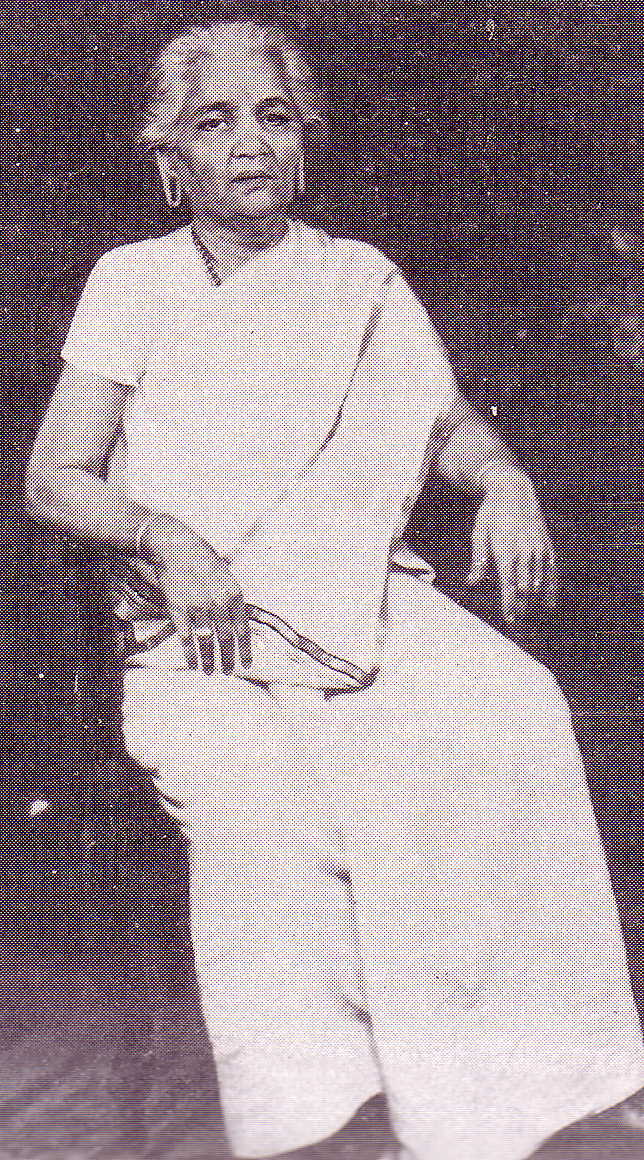
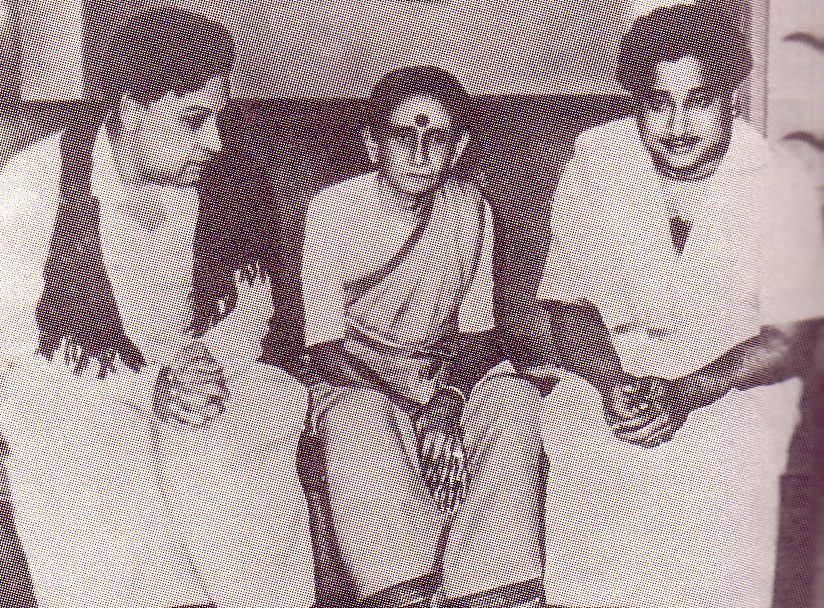
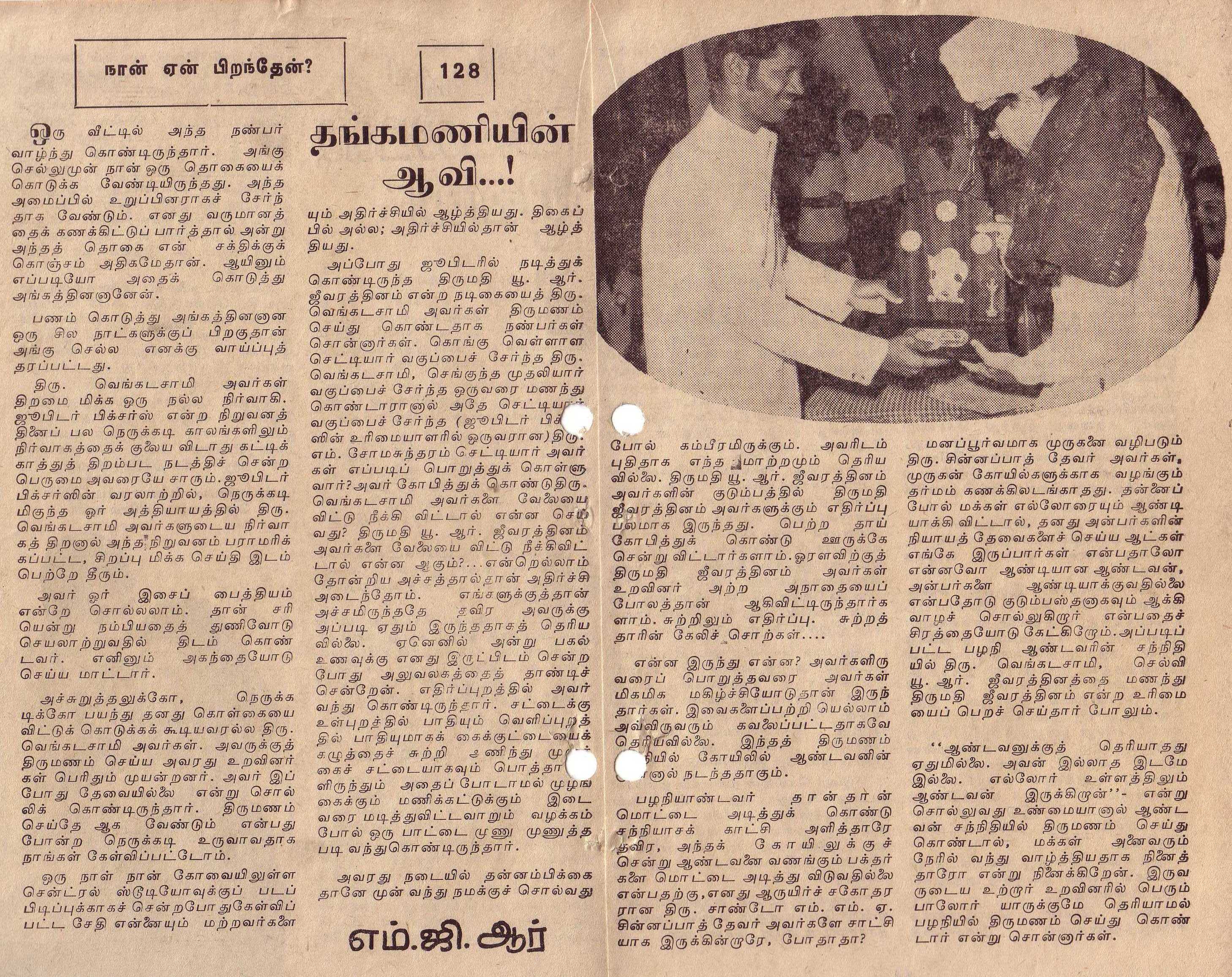
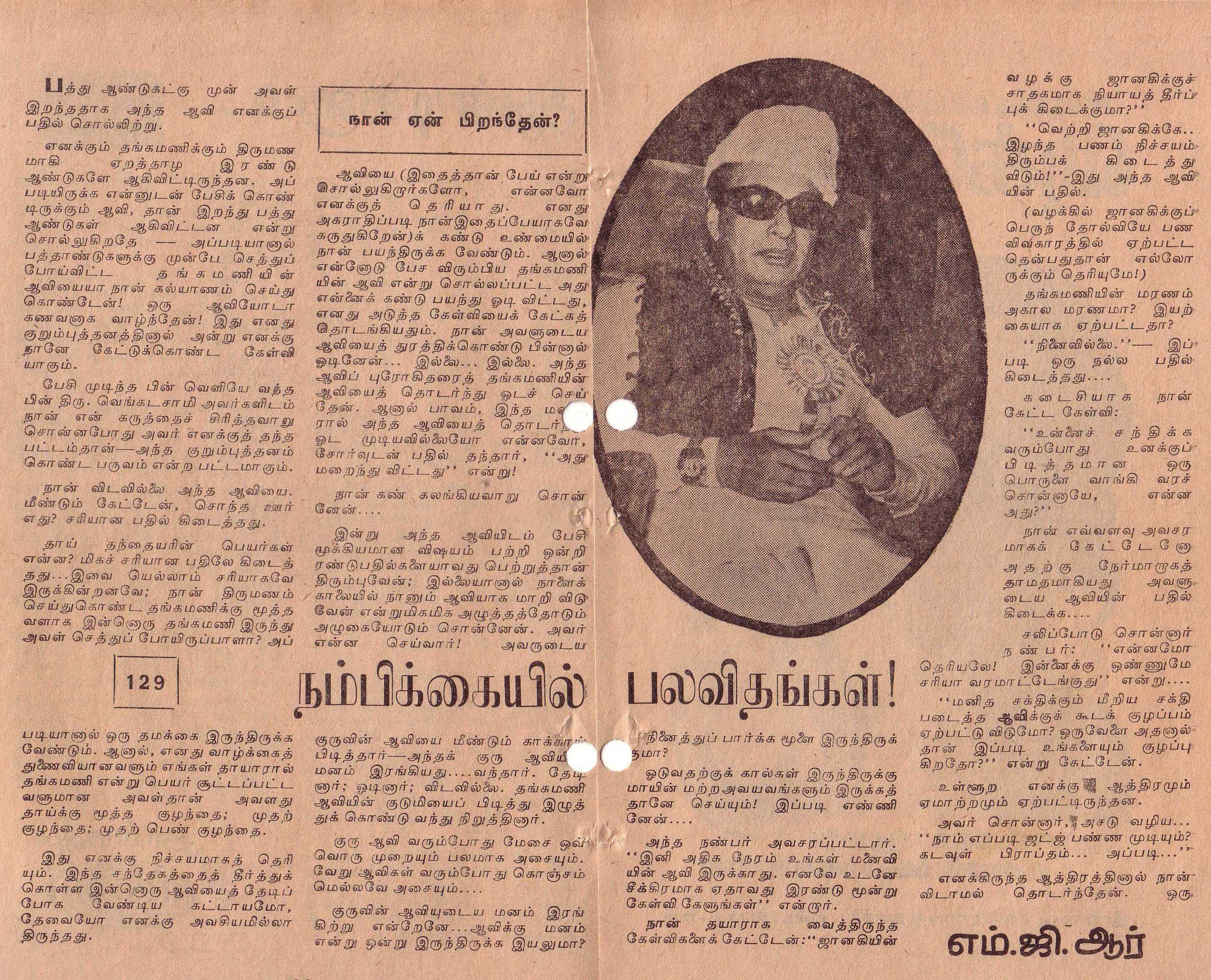
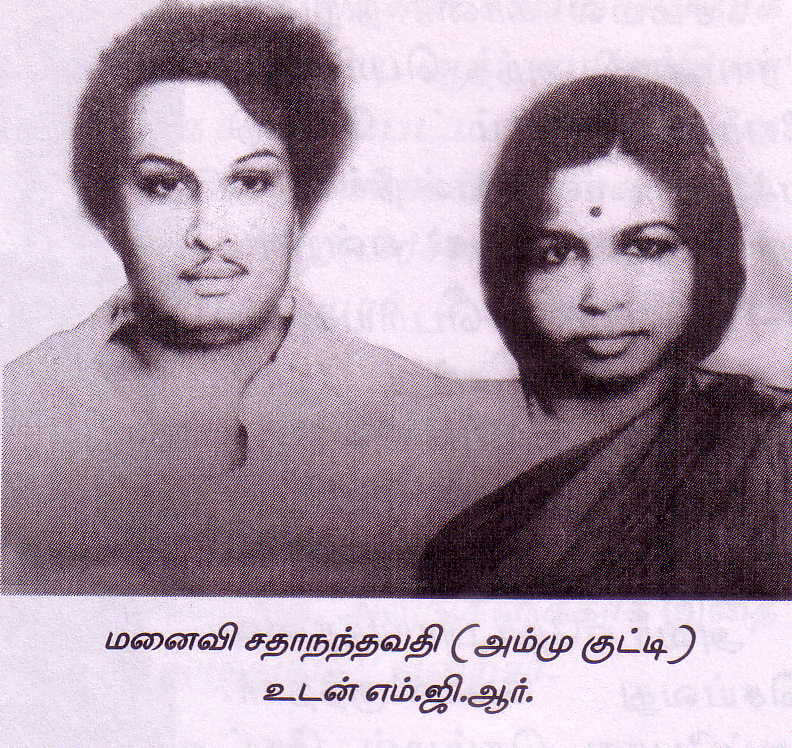
vanakkam,
mgr patri kannadasanin ullum puramum endru oru kirukkal by one pithukuli,
ennai nambi ketavarkal yaarum illai,ennai nambamal kettavarkal thaan undu enbathu thalaivarin pon varikal,indru varayil antha vaakku ullathu.
ivvaru irukka kudiyum,penkaludan ullasamum endra kadhiyil vazhndha k.dasan,
chandrababu enna maathiri nadanthirunthaal thalaivar avargalidam ivvaru nadanthirubar yenbathai ulagam ariyum. kaalathai vendravar,kaaviyamaanavar
tamil ulla varayil tamil idayangalil vazhnthu kondirubavar mgr.